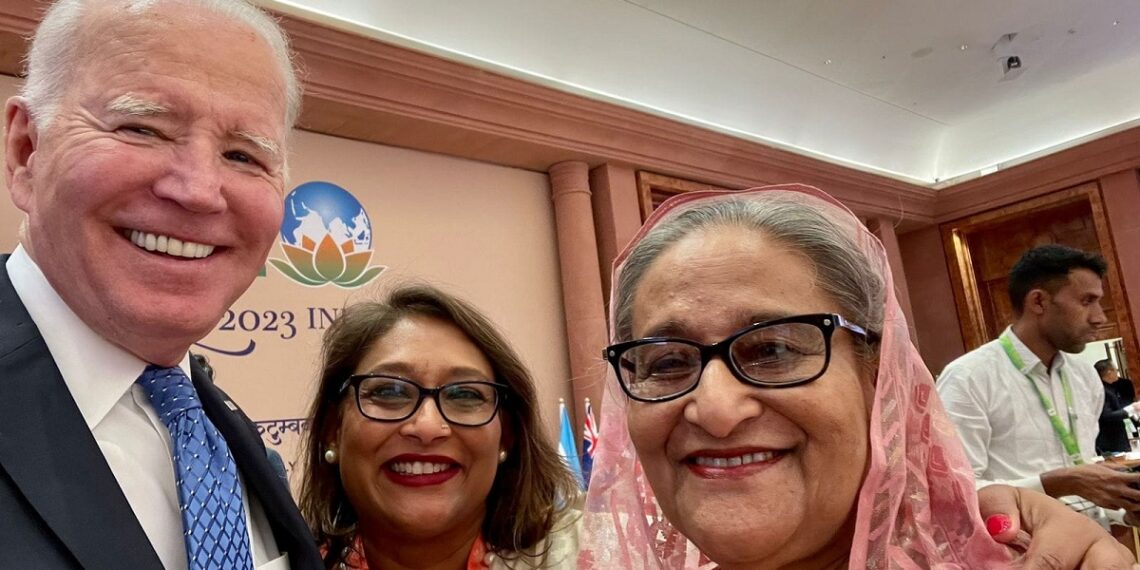It has taken less than a year for the United States to lose all credibility in Bangladesh. What began in June 2023 to gather pace by September-October the same year – hectoring the Sheikh Hasina-led Awami League to hold “free and fair elections”, restore back to health Bangladesh’s grievously injured democracy and step away from police repression – has now turned into a cruel joke.
A day after he landed in Dhaka on May 14, US Assistant Secretary of State for South and Central Asian Affairs Donald Lu and out-going American Ambassador Peter Haas met Bangladesh Foreign Minister Hasan Mahmud.
Emerging from the meeting, and wearing a smug smile, Lu said that his visit was aimed at rebuilding “trust” following last year’s “tensions between the United States and Bangladesh”.
The American visitor sought to claim that the US “worked very hard to promote free, fair and non-violent elections” and it “caused some tensions”.
And then came the surprising turnaround – Lu said that “we want to look forward and not look back” and “we want to find ways to strengthen our relationship”.
This about turn came after a completely fraudulent election (on January 7, 2024) – ably backed by India – which not only overturned every tenet of democratic electoral principle but denied the vast majority of Bangladeshis the right to elect their representatives freely.
The first of Lu’s two-day visit to Dhaka was devoted to meeting representatives from a cross-section of Bangladeshi civil society organisations. But curiously enough, among those who were not invited to meet Lu were those who took grave personal risks to speak out against the Sheikh Hasina regime’s excesses.
ALSO READ ‘Free and fair elections’ in Bangladesh: An American ruse that worked well
A day later, Lu’s statement reeked of a compromise, a word that Bangladeshis are all too familiar with even as they witnessed the systematic destruction of political and democratic institutions, wanton violation of human and labour rights, protection to business houses which had looted the banks and a criminal negligence to arrest a tottering economy that is not too far from going aground.
Suddenly, all of this has been pardoned by the very man who delivered a signed message on November 13 to the three main political parties – the Awami League, the BNP (which boycotted the elections) and the Jatiya Party.
The letter said that the US not only wanted free, fair and inclusive elections but also sought unconditional dialogue among the political parties and reminded them that the visa restriction policy was in operation.
However, as the Bangladesh Election Commission, ably backed by the ruling Awami League, proceeded with a sham exercise on January 7 – infamously marked by “dummy” candidates – the US sought to condone this criminal act that brought Sheikh Hasina back to power for the fourth consecutive time.
The BNP, which fell for the US’ free and fair election rhetoric, found itself in a piquant situation as much of Bangladesh boycotted the polls even as the Election Commission recorded a 41 percent turnout.
ALSO READ US and UK say Bangladesh elections ‘not free or fair’ and were marred by violence
Once the fraud was enacted and a ‘government’ put in place, and congratulatory messages poured in from China, India and Russia, the US authorities maintained a stoic silence.
Soon, the Awami League’s electoral crime was normalised. No punishment – not even a rap on Sheikh Hasina’s knuckles, much less economic sanctions and other punitive measures – was meted out.
The US inaction was then interpreted as an outcome of an unspecified deal. The US policy on Bangladesh and the latter’s relations with American authorities has since been marked by opacity and non-transparency.
Bangladeshis were no wiser then, as they are now, on what tied American hands to act against a recalcitrant Sheikh Hasina. Was there a deal? If yes, over what? Myanmar?
There is no doubt that the US has political and economic interests in Myanmar, especially in the context of China’s growing footprints in this trouble-torn country where there now appears to be a military stalemate as far as the insurgent forces and the junta army are concerned.
While reports indicate that the US’ Burma Act plan remains unfulfilled, a critical region of Myamnar, the Rakhine State, continues to remain a battlefield with no side in a position to claim that it has total control over the region.
The Indian government’s political and economic interests in Myanmar are also in jeopardy. Indian National Security Advisor Ajit Doval visited Dhaka in February to convince the Hasina that the use of Bangladeshi territory was vital to take action against the Arakan Army which has seized control over crucial ports and townships where India has critical interests. But he was roundly rebuffed.
Since then, neither the US nor India have been able to make much headway in Myanmar. Meanwhile, the Indian parliamentary elections went underway, distracting the national security establishment from finding ways and means in Myanmar.
It is no wonder that Lu’s statement, which has certainly buoyed the ruling Awami League while the BNP remains dismayed, has caused consternation among Bangladeshis, including those who lead and work for civil society organisations.
While they are reluctantly settling down to accept the Sheikh Hasina regime and rue the worsening economic conditions, anti-US sentiments and mistrust of America is bound to deepen as it has happened in the context of India’s role.
While it is unclear whether Lu was able to extract any concessions from Dhaka, the fog over Bangladesh will begin to lift as the Indian elections draw to a close in early June.















